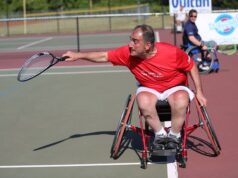By Shaun J. Boyce, Ankle Biters Tennis Association
Does your tennis committee know what you want? Do you feel it takes too long to replace a light bulb at the courts? Do your courts need resurfacing? Does the committee know if you are working to build a new league team out of the neighborhood? In conversation with league players and tennis committees, as well as community members, I have found that many of these conversations are rooted in frustration.
Many of these interactions can be improved with better communication. Only a few personalities are willing to volunteer their time to help the community by joining the tennis committee. The committee should be respected and appreciated much more than it often is.
But why is it that the tennis committee doesn’t know what you want? I believe it is because what the community wants is rarely conveyed to the committee. It should be up to the homeowners who are involved with utilizing the facilities, and it is likely that you, the “community of tennis players,” are not offering enough feedback.
How many times have you received an email or phone call from the HOA or tennis committee asking for your feedback on something? Have you responded with your thoughts and concerns? Have you shared with them your experiences with other community members or the local teaching professionals who work with the tennis playing families? You know it’s acceptable to send feedback, requests and suggestions without prompting, right?
This kind of feedback is the only way a tennis committee can make an informed decision when deciding what to do in their monthly or quarterly meetings. If there is little feedback from the homeowners, the committee is less incentivized to make changes or complete requested tasks, which usually costs them resources. This is especially true in smaller communities.
In a larger community, there often is more facility usage and therefore it is more likely that an abundance of feedback is received. The larger communities also have more resources to resurface courts, replace lights quickly and update the court reservation system or to install better technology for access systems. In short, if you are not in contact with the tennis committee, then it is less likely to make informed decisions based on homeowner feedback.
Now this doesn’t suggest that those of you who are vocal need to be any louder. It does, however, push you to remind your friends and neighbors to be more involved with helping the volunteers on the committee to serve the community. Information is the key to making informed decisions, so how can we complain about the volunteers – who are doing their best to answer the call to speak for the community – if they are uninformed about what you want?
Get in touch. Get involved. Volunteer your own time and energy. Lead by example in whatever capacity you choose to help your tennis committee. Remember that the members are volunteers and that they deserve your respect and your support.
ALTA Facility Guidelines
All courts approved for ALTA play must meet certain guidelines. Any facility interested in league play can submit a request via altatennis.org. ALTA volunteers will visit and determine if the conditions are met. Those requirements include:
For ALTA new facility request: The facility must be within the 1998 boundary of the five-county Atlanta metropolitan area that includes Clayton, Cobb, Dekalb, Fulton and Gwinnett.
For ALTA annexation request: The facility must be located within 10 miles of the same five-county as above and be within 10 surface miles of an existing limited access highway.
These criteria must also be met for facility approval:
- There must be at least two playable, lighted courts available for league play. All approved courts must have lights.
- Public restroom facilities must be accessible year-round and available during all ALTA matches. They must be located no more than 300 feet walking distance from the court surface.
- Facility must be completed and ready for inspection before submitting application.
- Facility must be visited by an ALTA Executive Committee member.
- The addition of courts at a later date will require another inspection.




